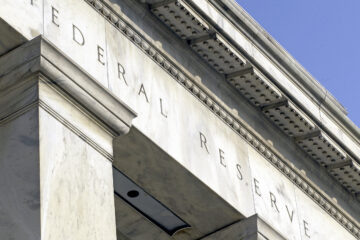US
US stock market marks new record highs with the hopes rising for the soon vaccine development and investors’ look into the Biden’s victory on the US presidential elections. S&P500 closed at 3,585.15 with weekly gain of 2.16%. Dow-Jones Industrial Average Index (DJIA) was up 4.08% reaching 29,479.81.
After the Joe Biden’s victory US stocks found themselves in a good position, due to high likelihood of fiscal and monetary stimulus and reduced effect of anti-monopolistic actions or tax raises, as a result of the constraints posed by a split in Congress. Nevertheless, the following weeks are expected to introduce volatility into the market with Trump’s final 2 months as a US president giving him a great capacity for disruption.
The news about Pfizer and BioNTech’s vaccine trials contributed to the positive movement on markets, with the US stocks hiking on Monday and further loosing the steam with a number of questions arising regarding shot effectiveness, as well as, production and distribution constraints. Despite the positive trend in S&P500, Cboe Volatility Index aimed higher, signaling investors increasing concerns regarding the following months of long and difficult recovery, as well as, turbulence likely caused by the Trump’s actions in the following 10 weeks of his presidency.
The earnings yield gap between equities and sovereign bonds has been pushed to a 18-months low with benchmark yields coming within 1% level, the yield on the benchmark 10-year paper closing the week at 0.90% up 8 basis points compared to one week ago closing. 2-year bond closed at 0.18%, with a change of 1.6 bps, meaning that the curve shifted up and steepened by 6.4 bps.
On the currency side, the EUR/USD lost 0.32%, diminishing from 1.188 to 1.184 with the lowest mark of 1.178 on Wednesday. The dollar index, which reflects the performance of the dollar against its major peers ended the week at 92.72 on Friday, recording a weekly gain of 0.53%.
Europe
Coronavirus cases surge across European countries, with Italy marking above 30,000 cases daily and Belgium having the highest death per capita ratio since the beginning of a pandemic. Hospitals’ ICU capacities are exhausting in France, with 94% of intensive-care beds already occupied. Highest daily death tolls are recorded since April. However, the number of new cases growth has begun to slow down in a number of European countries, including UK, France, Germany. The rapid spread of the disease and the introduction of lockdowns and restrictions on activities raise serious concerns for the European economy, which faces the deepest recession ever.
The deal over the EU’s long-term spending plans is sealed, with a record 1.8 tln euro budget and a package of stimulus measures. Another deal, which would allow European Commission to raise 750 bln euro jointly backed debt is still on approval. These measures taken for the recovery speeding will allow the European economic output to increase additional 2% in the following years, according to the Commission expectations. ECB is likely to continue its stimulating policy via the bonds purchasing program expansion (to be discussed at December meeting) and long-term loans provision, stepping back from the interest rates reduction. Changes are expected to be introduced for the ultra-cheap credits for banks.
European stocks have seen gains this week, with investors embracing the news of the Joe Biden’s victory and successful covid vaccine trials. Eurostoxx 50 raised by 7.12%, closing at 3,432.07. Eurostoxx 50 futures were up at the beginning of the week with the following retreat from the rally. German DAX increased by 4.78% to 13,076.72. FTSEMIB reached 20,903.58, growing 6.21%. CAC40 was up 8.45%, closing on Friday at 5,380.16. However, investors might be concerned about the relative performance of European stocks, which risk trailing their regional rivals in the future.
Markets’ recent positive attitude towards the recovery spurred by the news about vaccine development by Pfizer and BioNTech seems to be overrated. Christine Lagarde has warned investors of the months of losses yet to come.
On the currency side in Europe, EUR/CHF closed at 1.0803 with a change of 1.01%. The EUR/SEK closed at 10.2844 with a weekly change of 0.25%, whilst the EUR/NOK lost 0.24%, closing at 10.8461.
UK
FTSE 100 rose by 6.88% in line with the European stocks, closing at 6,316.39. FTSE 250 finished at 19,270.00, up 7.55% over the prior week. 10yr Gilt and 2yr Gilt reached 0.341% and at -0.022%, correspondingly. GBP/USD traded at $1.3199, with a maximum of $1.3290 on Wednesday.
Brexit talks over a trade agreement that were held during this week in London are to be continued in Brussels, with the 15 November deadline extended. Even in case of a tariff free trade agreement companies will still be faced with the increased bureaucracy complications. To allow industrial companies be better prepared for Brexit in the year end UK government is increasing its communications with industry.
The Upper House of UK Parliament has voted against the legislation giving the power to the UK ministers to unilaterally rewrite parts of the Withdrawal Agreement, signed with EU – the controversial legislation that Boris Johnson was pushing ahead which went against the international law.
UK relationship with the US may become more difficult with Biden, who does not seem to be willing to stay a unequivocal backer of Johnson’s Brexit policy. On Wednesday, Joe Biden had a call with Boris Johnson, during which he expressed his views on the situation with Northern Ireland.
Two key advisors of Boris Johnson – Lee Cain, his communication director, and Dominic Cummings, his chief advisor and the architect of the Vote Leave campain, – are to step down and leave the office, which may destabilize the prime minister’s inner circle.
Rest of the World
Asian stocks getting a boost on the background of Chinese economy fast recovery and the prospects of the decreased tension in the trade relations with the US.
Japan’s Nikkei225 was up 4.36%, closing at 25,385.87, whilst the Topix index rose by 2.70% to 1,703.22. On the currency side, the USD/JPY increased by 1.22% to 104.62, while EUR/JPY closed at 123.84 up 0.89%.
China’s CSI 300 index lost 0.59%, reaching 4,856.85, after Trump signed an executive order, prohibiting US investors to hold shares in companies, related to Chinese military on Friday. Hang Seng Index rose to 26,156.86, gaining 1.73% since last week. The EUR/CNY lost 0.40%, reaching the level of 7.8197, while the off-shore EUR/CNH saw a slightly lower loss of 0.30%, closing at 7.8050. The USD/CNY was down 0.08%, finishing on Friday at 6.6064, whilst the off-shore USD/CNH stayed flat gaining 0.02% and closing at 6.5940.
The ban on the Chinese video-sharing app Tik Tok, which was to become effective on Thursday has received a delay. However, Asian market is still vulnerable in expectation of future US actions against China, including a possible forced delisting of Chinese firms from US stocks exchanges.
Russian-negotiated peace agreement over Nagorno-Karabakh was signed by Armenia and Azerbaijan. Russian and Turkish peacekeepers will be deployed in the war-torn region. The event was marked by protests in Armenia.
OPEC and its allies are to maintain their current cuts in production till early 2021 and are likely to postpone an increase in production planned for January, which is good news for the market. Brent crude oil futures continue to rise. WTI was up 7.37% compared to the prior week, reaching 40.08, while Brent Crude rose 7.65% to 42.63, based on the hopes that the introduction of the vaccine will boost the demand in the future.
Gold, which is usually perceived as a heaven asset, was down 3.24% this week, reaching 1,888, marking increased investors’ expectations of better performance on the stocks market.



0 Comments